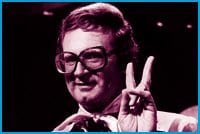The Life of Reilly is not just for fans of TV camp from the 1970s. Devotees of B-list celebrity booze-fests disguised as game shows (Match Game) and talk shows (Tonight Show) already know the comic genius that was Charles Nelson Reilly. With his signature clenched-jaw laugh, moist lips, ascots and Anna Wintour glasses, he was a recognizably gay trailblazer.
This feature-length performance documentary from 2006 is terrific, showcasing the septua-genarian artist at the height of his powers, regaling audiences with stories from his unbelievably demented childhood and celebrity-studded Broadway, film and TV career.
The Life of Reilly is based on Reilly’s one-man show Save It for the Stage (advice oft given by his mother), filmed when Reilly was 73.
“You kike Jew bastards get away from my boy,” Reilly screams, remembering his mother yelling out their apartment window in a heavily Jewish neighbourhood in the Bronx. Such familial mortification was just the tip of the iceberg. Reilly’s family life was nuts, literally. But too many details here would dilute one of the film’s chief pleasures: sitting slack-jawed as Reilly recounts one unbelievable anecdote after another. “Eugene O’Neill,” he says, “would never get near this family.”
Reilly was a staple on ’70s TV: The Ghost and Mrs Muir, Lidsville, Love, American Style — proving wrong an NBC exec who told him queers don’t belong on television. Recent gigs include voicing Dirty Bubble on Sponge Bob Square Pants. But Reilly’s real career was on Broadway as a performer (winning a Tony for his appearance in How to Succeed in Business Without Really Trying), director (a Tony nom for the 1997 revival of The Gin Game) and acting coach.
He’s got great stories about studying under Uta Hagen with everyone who became anyone in Broadway and Hollywood, while his close friendship with Burt Reynolds offers some surprising moments.
Directors Frank L Anderson and Barry Poltermann mostly get out of the way, providing a sprightly paced version of Reilly’s stage show. But nearly all of the filmic additions don’t work, like the interviews with people in the street who barely remember Reilly. And the music is god-awful (whether it’s original to the stage or a newly added soundtrack is unclear) and threatens to overwhelm some beautifully poignant moments.
Ultimately Anderson and Poltermann should be commended for creating a document of Reilly’s heretofore unheralded talents. Reilly, who died in May of this year, lives on in countless YouTube excerpts of his many TV appearances; they’re definitely worth searching for (they’re absent from the doc, as is Reilly’s distinctive laugh). After seeing this film you’ll never look at those clips the same. Reilly’s deadly timing and bent wit arose from sadness, struggle and astute observation. That at 73 he could be so gracious and generous, smart and funny almost makes you look forward to growing old.


 Why you can trust Xtra
Why you can trust Xtra


